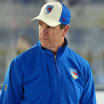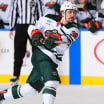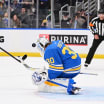McAuley was on wrong end of worst loss in NHL history
Goaltender allowed 15 goals in one game for war-depleted Rangers on Jan. 23, 1944
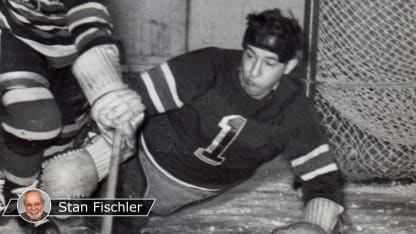
The goaltender who got the shutout was Connie Dion of the Red Wings. But nobody remembers him for that because Dion could have napped for most of three periods. The rookie goaltender had to make all of nine saves.
It was a different story for
Ken McAuley
, who manned the net for the New York Rangers, but we'll get to his traumatic tale in a moment.
This was wartime hockey, with top players at a premium. Many stars such as Rangers goaltender Jim Henry had enlisted in the Canadian and American armed forces.
At the start of the 1942-43 season, Rangers' manager Lester Patrick sought a replacement for Henry, who had led New York to first place in 1941-42 but was now playing for a Canadian Army team.
During 1942-43, Patrick's scouts combed Canada for a decent replacement, but one discovery was worse than the next. The losers list included, among others, Jimmy Franks, Bill Beveridge, and Lionel Bouvrette. In defense of the Rangers, it should be noted that they lost more top players to the armed forces than any other NHL team. Even Lester's sons, left wing Lynn Patrick and defenseman, Murray Patrick, had gone off to war.
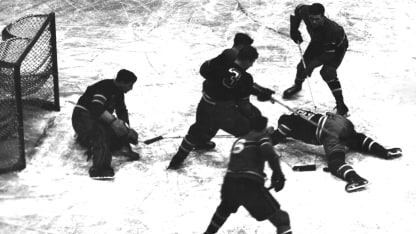
© B Bennett/Getty Images
Desperate, Patrick took the advice of an Alberta scout who had looked at McAuley, a star on the on the senior (amateur) level with the Edmonton Maple Leafs and Regina Rangers. Delighted to be in the NHL, McAuley (nicknamed "Tubby") nevertheless was burdened with a collection of wartime replacements in front of him.
If you think McAuley had it tough, imagine what it was like for the Rangers' radio broadcasters -- play-by-play man Bert Lee and analyst Ward Wilson. But they found a way to give hope to their avid listeners.
Whenever the Blueshirts were behind in a game -- which was too often -- Lee would turn to his sidekick and opine, "Time enough for one goal, Ward, time enough for 20!" And Wilson, the perfect straight man, would nod his approval.
However, on that fateful night in Detroit not even super-optimist Lee could summon the bravado to suggest in the third period that a New York victory was in sight. It was 7-0 Detroit after two periods and 15-0 after the Red Wings' s eight-goal third period -- although some observers believe No. 16 beat McAuley and went over the goal line before the final buzzer.
In retrospect, it's not all that difficult to discern the problems confronting New York's management before, during and after that fateful night, especially GM Patrick and his coach, Frank Boucher.
Patrick was forced to employ no less than 32 players in search of a winning combination. One of those players was Boucher himself; he was 42 and had not skated in the NHL for six years. Boucher still managed to produce four goals and 14 points in 15 games and outscored no less than 19 other Rangers that season.
But on the evening of the 15-0 shellacking, Boucher, who previously had been criticized by Patrick for mishandling the Rangers, wasn't even in the arena. He had been summoned to Ottawa upon the death of his brother Carroll. Boucher's replacement was none other than Patrick, who previously had denounced Boucher's competence behind the bench.
"It was a shocking experience for Lester," Boucher remembered.
It also took Boucher off the hook because his boss now realized how inept the Rangers were.
To say that McAuley, formerly a Saskatchewan truant officer, had a busy night would be the understatement of the half-century. He faced 58 shots, 15 of which went past him.
Just for the record, the Red Wings had 22 assists and 37 points during their goal bonanza. In the third period alone, fans at the Olympia were treated to eight goals, 14 assists and 22 points.
When recalling that horrendous night for his puck-shocked goalie, Boucher could only think of heroic military awards such as the Congressional Medal of Honor, the Purple Heart or similar honors.
"Tubby should have been awarded the Croix de Guerre, if not the Victoria Cross," Boucher said.
McAuley got neither, but grabbed plenty of ink in the NHL Record Book. It included his involvement in the following:
Most consecutive goals, one team, one game; most points, one team, one game; most goals, one team, one period; and most points, one team, one period.
Despite being saddled with his mostly inept teammates, McAuley maintained a positive disposition, not only playing every one of the Rangers' 50 games but yielding an NHL-record 310 goals. Perhaps amazingly, he won six games.
"Only a fraction of the goals Tubby gave up truly belonged to him," Boucher said, "but he very rarely complained against the fates that had deposited him in our goal."
McAuley came back for the 1944-45 season, playing 46 of New York's 50 games; he won 11, improved his goals-against-average from 6.20 to 4.93, and earned his only NHL shutout. But with the war over, Charlie Rayner and Henry handled the goaltending for the Rangers in 1945-46; McAuley went back to playing senior hockey in Edmonton.
But McAuley wasn't the worst goalie in Rangers history. That dubious honor belonged to Steve Buzinski, who lasted a grand total of nine games during the 1942-43 season. In fact, Buzinski was so awful that the press jokingly gave him a most amusing nickname: Steve Buzinski, "The Puck Goes Inski."
McAuley's nickname wasn't as funny and, believe it or not, he even made it into the Alberta Sports Hall of Fame.

